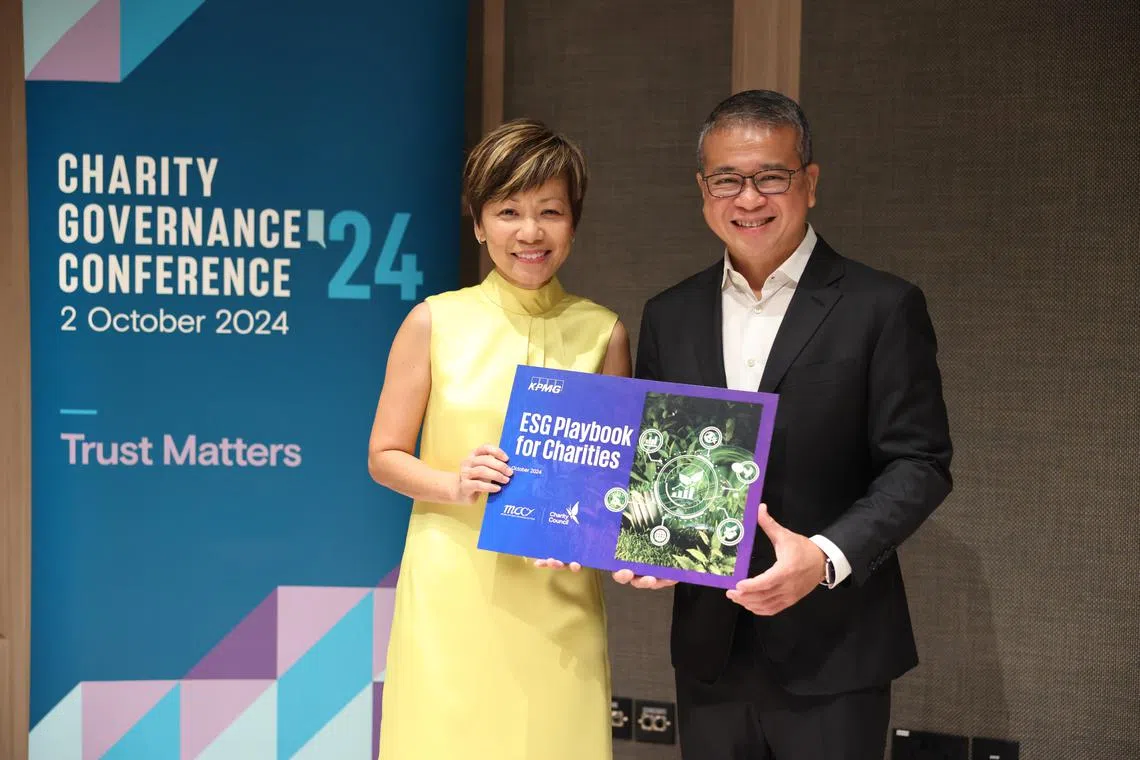KPMG, Charity Council launch ESG playbook for charities
The guide will benefit about 2,300 such organisations and outlines steps on integrating environmental, social and governance factors into board agendas

BOARDS need to recognise that sustainability is not a temporary trend but a vital component of charities’ long-term success.
That was one of the main takeaways from the ESG Playbook for Charities, launched by professional services firm KPMG and the Charity Council.
The new guide, released on Wednesday (Oct 2), will benefit about 2,300 charities and is designed to help them further integrate environmental, social and governance (ESG) principles into their daily operations.
On the significance of such a playbook, KPMG said that such principles have gained importance among investors, policymakers and key stakeholders, as they help safeguard organisations against future risks.
By integrating these concepts into their operations, charities can garner greater stakeholder support, attract new funds, and enhance operational efficiency. Such a move is also beneficial as corporates are increasingly focused on how they can maximise their investments to drive social impact, it added.
Cherine Fok, partner in the ESG team at KPMG in Singapore, said that the formation of the concepts in the playbook kicked off early this year.
Navigate Asia in
a new global order
Get the insights delivered to your inbox.
“The common vision (is to create) a… fit-for-purpose guide for charities in their... journey. This is because (they) have a crucial role to play in enabling a just transition, and are also vital in building Singapore’s social compact as key agents of social equity, accessibility, inclusivity and diversity.
“Yet, they may be often constrained by practical challenges around resources and know-how.”
She added that the playbook needs to be accompanied by a change management programme to help charities implement the recommendations. “To this end, KPMG will be partnering the Ministry of Culture, Community and Youth to organise workshops to further support charities of different sizes and needs.”

Workshops will be held in the first half of 2025 to onboard the charities to implement these practices.
Step-by-step approaches
The guide breaks down the journey into four stages: integrating ESG into board agendas; defining a tailored ESG strategy, which includes stakeholder engagement to understand the topics that impact the charity the most and which are prioritised by stakeholders; driving initiatives that reflect ESG priorities; and communicating progress to stakeholders.
The playbook is also linked to the Sustainable Philanthropy Framework initiated by the National Council of Social Services, which articulates the “S” in ESG.
The guide also includes step-by-step approaches on how to integrate ESG factors into board agendas, among others.
However, acknowledging that the playbook is not meant to be “static”, Fok said that the intention is to refresh it regularly to reflect changing social dynamics.
“This will help steer the sector to collectively adopt leading practices in tandem with Singapore’s progress towards a more sustainable and inclusive society.”
She added: “For example, just last month, a new global taskforce was launched to bring attention to the financial risks to companies and financial institutions of global inequality.
“The Taskforce on Inequality and Social-related Financial Disclosures will develop a global framework for companies and financial institutions to include within their public reports more effective disclosures about impacts, dependencies, risks, and opportunities related to social issues, including inequality.”
Such key developments, the KPMG partner added, will be progressively introduced to the charities sector in Singapore via the playbook, together with a tailored change management programme.
Home Nursing Foundation, which provides home healthcare services, is a charity with Institution of a Public Character status.
Its CEO, Christina Tiong, said that having such a framework “helps us to create trust with funders by having a common measure to describe our efforts for environmental sustainability (for example, recycling of home-care equipment), social justice (such as patient advocacy, staff and volunteer welfare), and governance (for instance: internal audits, board structure, donation handling and disclosure practices)”.
Moreover, ESG is a new requirement in the charity code of governance, she added.
The other new initiatives announced by Minister for Culture, Community and Youth and Second Minister for Law Edwin Tong at the annual Charity Governance Conference include the introduction of a panel which offers screening and consultancy services, to protect charities from being involved or misused for money laundering and terrorism financing.
Decoding Asia newsletter: your guide to navigating Asia in a new global order. Sign up here to get Decoding Asia newsletter. Delivered to your inbox. Free.
Copyright SPH Media. All rights reserved.

